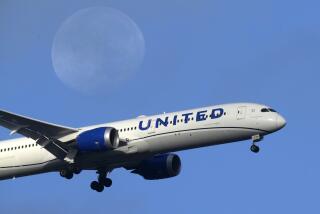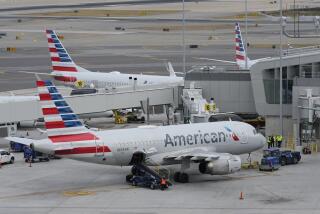United Airlines and Buy.com Plan an Online Travel Agency
- Share via
Further expanding onto the turf of travel agents, United Airlines Inc. and Aliso Viejo-based Buy.com Inc. said Monday they will open an online travel agency.
The new company, BuyTravel.com, is slated to launch this year as a full-service retail agency that offers deeply discounted airline seats that United currently sells only through its own Internet site.
“To differentiate ourselves from other travel Web sites, we needed proprietary products from vendors,” said Allen Barbieri, Buy.com’s chief financial officer. “This way we can do everything that a travel agency can do, without a travel agency.”
Also on Monday, Continental Airlines said it will sell some of its excess tickets through Priceline.com, giving the Stamford, Conn.-based online firm access to almost half the empty seats flown by major U.S. carriers.
Terms of the United-Buy.com joint venture were not disclosed, and its management has not yet been named.
BuyTravel.com will be the eighth product category for Buy.com, whose strategy is to offer the lowest prices on everything it sells--even if it is at cost--and make money by selling advertising on its site.
For United, opening an agency is a break from tradition in an industry that recently has had a rocky relationship with those who sell its products: travel agents.
Through its own Web site, United Airlines already offers a full range of travel products, including tickets of most airlines, hotel rooms and car rentals. But because consumers visiting the site expect to buy United tickets, it is not considered a direct competitor to travel agencies.
“Our site tends to attract people who are loyal to the brand and familiar with United,” said company spokesman Kurt Ebenhoch.
“With BuyTravel.com, we’re trying to offer our products and e-fares to people who are looking for great deals. We’re trying to build an Internet portfolio because we see a big future there based on consumers wanting to buy tickets that way.”
While airlines have had ownership interest in travel ticketing companies in the past, generally they have not owned any business going head to head with the travel agents.
“This is fairly unique, if United is going to be a hands-on owner,” said Brian Simpson, an airline consultant with the Boyd Group in Evergreen, Colo.
“The travel agents have felt like they have been abused, simply put, by the airlines, and one of the issues they face is the ability for consumers to get travel products directly from the suppliers.
“This deal could certainly exacerbate that,” Simpson said.
Travel agents sell about 80% of all airline tickets, but much of that is through corporate ticketing agencies. Smaller agents that sell leisure-travel tickets generally have been hit harder by the airlines’ push to sell directly.
If more airlines decide to own travel agencies, the industry could move to a dealership model, similar to that of car sales.
“Up until this time, travel agencies have by and large represented all airlines equally,” said William Maloney, executive vice president of the American Society of Travel Agents.
“If we do go to dealerships, which some have suggested, it would be incumbent upon them to tell consumers that they are dealerships. It requires a little bit more disclosure, and it may confuse the public before they come to terms with it.”
In the last few years, airlines have aggressively used the Internet to cut the costs of selling tickets, often at the agents’ expense. Airlines have reduced and capped agents’ commissions on selling tickets, aggressively marketed their own Web sites and used the Internet to sell excess inventory.
All told, as much as 5% of U.S. airline revenue comes from passengers’ booking flights over the Internet, according to a report released Monday by Salomon Smith Barney.
Travel services have been among the most successful categories online, with $2.7 billion of airline tickets, hotel rooms and car rentals sold over the Internet last year, according to the Boston Consulting Group. This year, it said, that figure will grow to $7.3 billion, or about 1.8% of the total market.
More to Read
Sign up for The Wild
We’ll help you find the best places to hike, bike and run, as well as the perfect silent spots for meditation and yoga.
You may occasionally receive promotional content from the Los Angeles Times.






